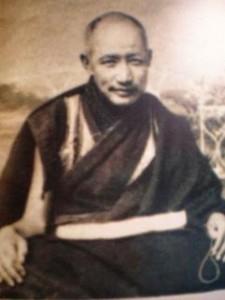Khedrub Botrul Rinpoche Dongak Tenpe Nyima
Khedrub Botrul Rinpoche Dongak Tenpe Nyima (Botrul Do-ngak Tenpai Nyima) (1900 – 1959) was born in Dakpo, in the eastern part of central Tibet. When he was very young, his spiritual predisposition awakened and he entered the path of dharma. At a certain point, he joined an eastern Tibetan merchant on a pilgrimage and journeyed to eastern Tibet in search of teachings. Because he was still so young and his homeland was far away, Do-ngak Tenpai Nyima had no provisions for supporting himself while receiving teachings and therefore endured many hardships, including a lack of adequate clothing, and adopted a way of life reminiscent of the lord Milarepa’s.
He finally reached Dzogchen Monastery in eastern Tibet and studied with all of the gurus, tulkus, khenpos, and teachers residing there, investigating the thirteen great source texts and teachings from the sutras, tantras, and other fields of knowledge. He joined the ranks of the learned. From Dzogchen Tupten Chokyi Dorje, he received many empowerments and oral transmissions for the practice of tantra. Dzogchen Rinpoche took responsibility for Botrul Do-ngak Tenpai Nyima and accorded him many honors. For example, he conferred the title of tulku on him, seated him during large gatherings on a throne that stood in the center at the back of the hall, and assigned several monks as his attendants when he traveled. Everyone honored him as Bopa Tulku. Botrul Do-ngak Tenpai Nyima attracted many students from all directions and upheld and fostered Mipam Rinpoche’s teaching methods. Among his students were Khen Chochap, Khenchen Pema Tsewang Lhundrup, Khen Tupten of Mepa, Khen Tupten of Rahor, Khen Dazer, and many other learned masters. He wrote numerous extensive and more concise works, including The Delination of the Tenets of View, An Overview of the Perfection of Sublime Knowledge, and A Word-by-Word Commentary on the Perfection of Sublime Knowing.
